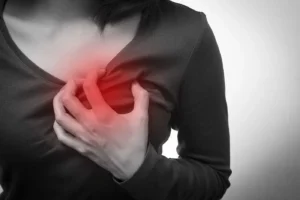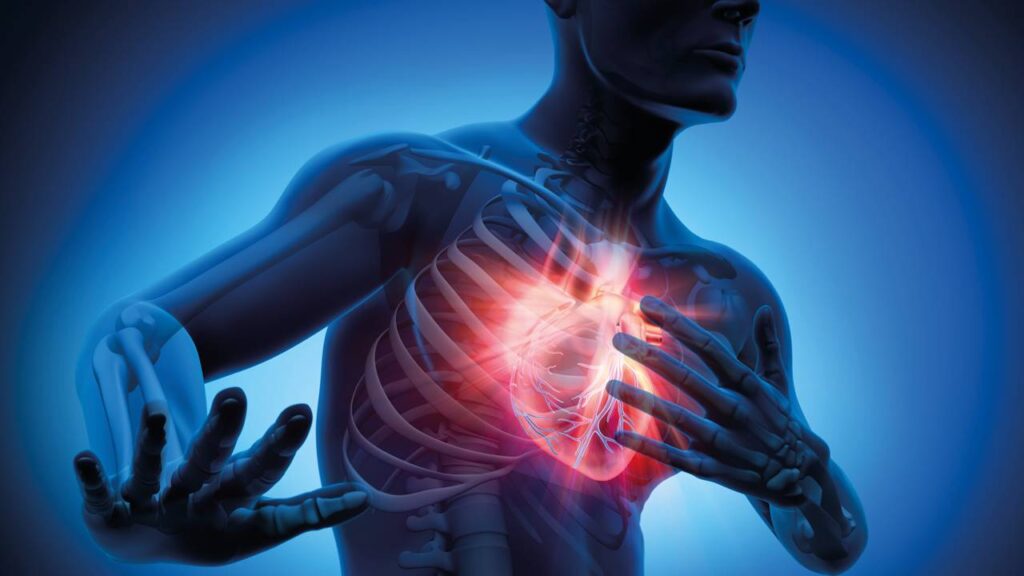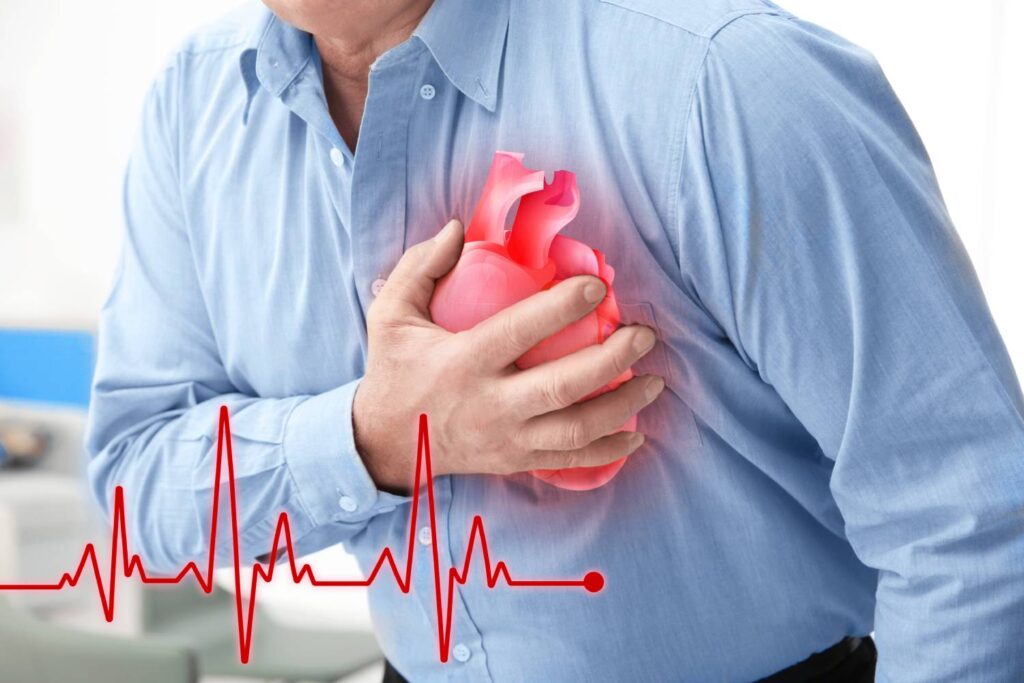Ever felt that uncomfortable, burning sensation in your chest and wondered if it’s just heartburn, or could it be something more serious, like a heart attack?
It’s a common dilemma—heartburn and heart problems can feel very similar, making it hard to tell the difference.
But can heartburn really be a sign of something more serious? And how can you tell if that chest pain is caused by an underlying heart issue?
In this blog, we’ll dive into the difference between heartburn and heart attacks, explore when heartburn might signal heart problems, and give you insights on how to tell when you should seek medical attention.
Contents
What Is Heartburn and What Causes It?
 Heartburn is a common condition where you experience a burning sensation in your chest, usually after eating or when lying down.
Heartburn is a common condition where you experience a burning sensation in your chest, usually after eating or when lying down.
This discomfort occurs when stomach acid backs up into the esophagus, the tube that carries food from your mouth to your stomach. The acidic reflux can irritate the lining of the esophagus, leading to that familiar burning feeling.
Symptoms of Heartburn:
- Burning pain in the chest (often after eating or at night)
- Regurgitation of food or sour liquid
- Difficulty swallowing
- Chronic cough or hoarseness
- Sore throat or lump in the throat
Common Causes of Heartburn:
- Acid reflux: The most common cause of heartburn, where stomach acid escapes into the esophagus.
- Spicy, greasy, or fatty foods: These foods can trigger acid reflux and make heartburn worse.
- Large meals or lying down after eating: These habits can increase pressure on the stomach and cause acid to flow back up.
- Gastric issues: Conditions like gastritis or hiatal hernia can lead to frequent heartburn episodes.
- Caffeine, alcohol, or carbonated drinks: These can relax the lower esophageal sphincter, allowing acid to reflux.
Although the symptoms of heartburn can mimic those of a heart attack, it is typically a digestive issue rather than a cardiovascular one. The key difference is that heartburn is usually related to stomach acid, while a heart attack involves heart muscle damage due to restricted blood flow.
Can Heartburn Be a Sign of Heart Problems?

While heartburn is typically a digestive issue, it can sometimes be a sign of something more serious, including heart problems. In some cases, heartburn can mimic symptoms of a heart attack or other cardiovascular conditions, leading to confusion between the two. However, it’s important to recognize when heartburn might be more than just a temporary discomfort and could indicate a deeper health concern.
When Heartburn Might Indicate Heart Problems:
- In rare cases, the spasms in the esophagus that cause heartburn can also be linked to cardiac problems. These esophageal spasms can create symptoms that feel like a heart attack, including chest pain and discomfort.
- Sometimes, heartburn can occur alongside angina, which is chest pain caused by reduced blood flow to the heart. The pain might feel similar to heartburn, but it’s related to the heart, not digestion.
- Acid Reflux and Heart Disease: There is some evidence suggesting that individuals with chronic acid reflux (GERD) are at a higher risk of developing heart disease, although the link is not fully understood.
When to Be Concerned?
If you experience symptoms like chest pain, shortness of breath, pain radiating to your arm or jaw, or lightheadedness along with heartburn, it’s important to seek immediate medical attention. These can be signs of a heart attack or heart disease, which require prompt treatment.
If you’re uncertain, don’t wait—it’s always better to err on the side of caution and get checked by a healthcare provider.
Difference Between Heartburn and a Heart Attack
Heartburn and a heart attack can both cause chest pain, but the symptoms, causes, and severity are very different.
- Heartburn is typically a burning sensation caused by acid in the stomach, and the discomfort can usually be relieved with antacids or by changing positions.
- Heart attack pain is more intense, often described as crushing or tight, and might not go away without medical intervention. It can also be accompanied by other symptoms like shortness of breath and nausea.
If you’re experiencing chest pain that doesn’t go away or is accompanied by difficulty breathing, pain radiating to your arm or jaw, or profuse sweating, it’s critical to seek medical help immediately—it could be a heart attack.
And if you’re dealing with heartburn or suspect it could be related to heart issues, MantraDoc is here to help. Our expert cardiologists are ready to guide you through your symptoms and provide the care you need.
📞 Click here to get connected with a cardiologist today!
Treatment for Heartburn vs. Treatment for Heart Attack
While heartburn and a heart attack both cause chest discomfort, the treatments for these two conditions are vastly different. Here’s a quick comparison of the treatment approaches for each:
| Treatment | Heartburn Treatment | Heart Attack Treatment |
|---|---|---|
| Immediate Care | Antacids and H2 blockers to neutralize stomach acid. | Emergency treatment in a hospital setting (e.g., CPR, defibrillation). |
| Medications | Proton pump inhibitors (PPIs) to reduce acid production. | Aspirin to prevent clotting and blood thinners to reduce clot formation. |
| Lifestyle Changes | Avoiding trigger foods (spicy, greasy, acidic). | Dietary changes to lower cholesterol and improve heart health. |
| Dietary Adjustments | Eating smaller, more frequent meals. | Low-sodium, heart-healthy diet to reduce blood pressure. |
| Physical Activity | Light physical activity after eating (to aid digestion). | Cardiac rehabilitation and light exercise to improve heart health post-heart attack. |
| Surgical Intervention | Surgery may be required for severe GERD or complications like hiatal hernia. | Surgical procedures such as angioplasty, stent placement, or bypass surgery for blocked arteries. |
| Prevention Tips | Avoid smoking, limit alcohol intake, and manage stress. | Quit smoking, maintain a healthy weight, and exercise regularly to prevent further heart attacks. |
| Recovery Time | Recovery is quick with lifestyle changes and medications. | Recovery from a heart attack may take weeks or months, requiring ongoing medical supervision. |
By understanding the differences in treatment for both conditions, you can take steps to prevent or manage them effectively. If you’re experiencing frequent heartburn or worrying symptoms of chest pain, it’s always important to consult a healthcare professional for the right guidance.
Conclusion
While heartburn and heart attacks may feel similar at times, the treatments and causes are very different. Heartburn is a manageable condition, typically treated with medications, lifestyle changes, and dietary adjustments. On the other hand, a heart attack requires emergency treatment, immediate medical attention, and possibly surgery to restore heart function.
Be it any case, don’t take chances with your heart health. If you’re experiencing symptoms or unsure about your condition, get in touch with a doctor today for an accurate diagnosis and treatment plan.

